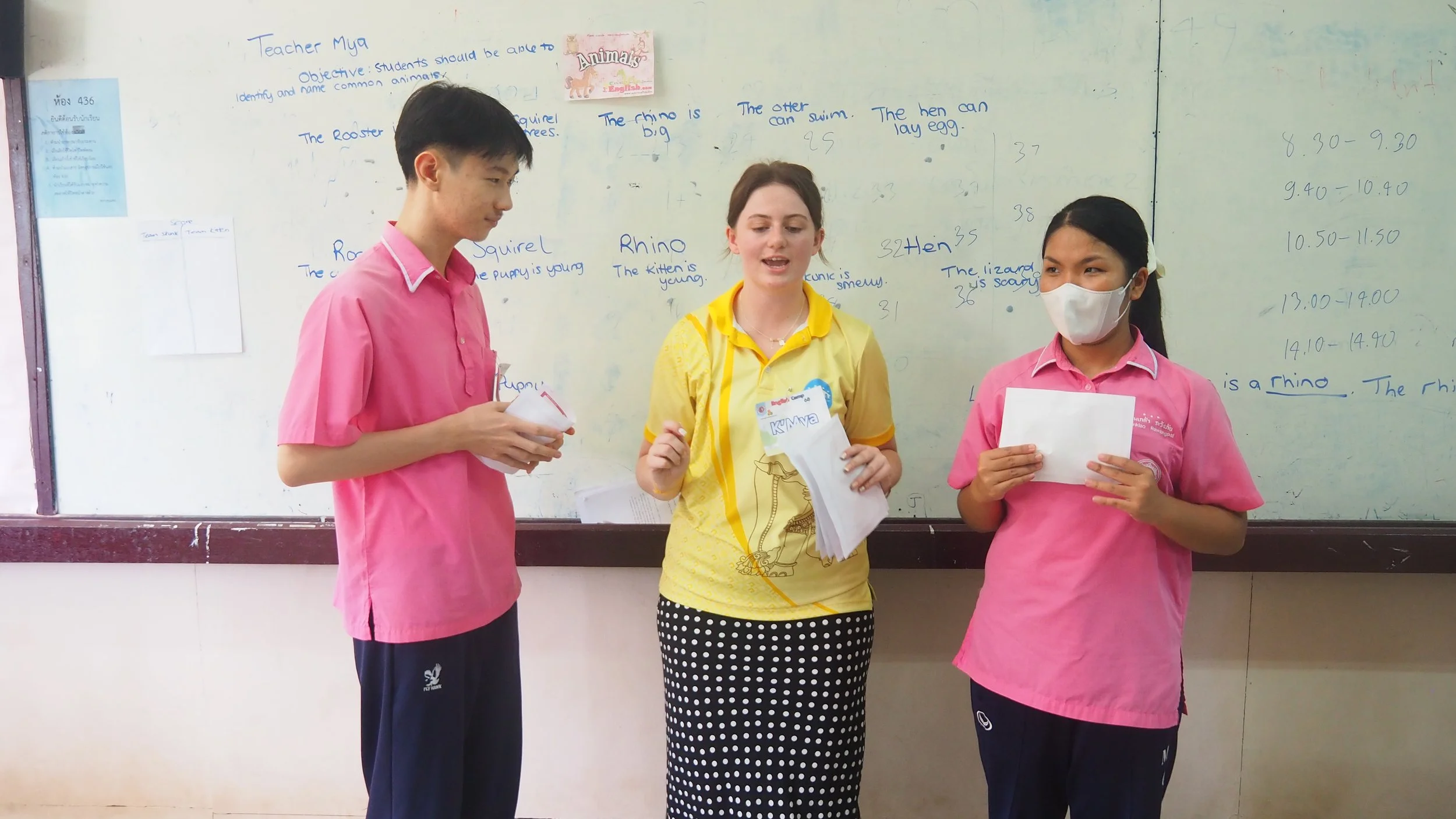True Market Salaries
KET covers 100% of your Thai income tax for the first two years. Your offer letter is exactly what you take home—guaranteed.
Experience the ultimate journey with the family agency recruiting since 2009. We provide an umbrella of legal and logistical support to ensure your success.
Fully regulated by the Teachers' Council of Thailand (Khurusapha). We ensure every 2026 placement is 100% legal, providing the mandatory license waivers needed for your digital Work Permit.
Experience the security of a family legacy. We provide the legal guidance and school-funded logistics needed to thrive in Thailand.

KET covers 100% of your Thai income tax for the first two years. Your offer letter is exactly what you take home—guaranteed.

Our 6-day orientation in Sukhothai includes 5G SIM, transport, and catered meals. Bond with your cohort at our family HQ.

Enjoy your private ensuite room in the heart of Sukhothai. Modern comfort steps away from the historic night markets.

We handle 100% of paperwork and escort you to your province. We even set up your Thai banking on day one.


Established
1945
Based in Ban Lum, we are an 80-year family legacy led by the CEO (Mum). We bridge the gap between world-class educators and Thailand's premier academic institutions.
Woman-owned, family-led since 2009, and LGBTQ-friendly local experts. Our squad provides a professional umbrella for your 2026 teaching adventure—rooted in 80 years of community trust.
Three generations of family business in Sukhothai. We bridge ancestral local wisdom with modern educational standards.
Rooted in Ban Lum for 80+ years. She ensures our family values and deep local trust remain the core of every placement.
A 20-year education veteran. Matthew manages training, supports your daily growth, and provides lifelong references for your future studies.
Liaison for Non-B Visas and TCT logistics. Lukpaa ensures year-round support and manages all school-funded paperwork.
Manager of the zero-fee model. Kee oversees school funding and provides essential resettlement ground support.
Expert in Active Learning pedagogy. Mai provides hands-on orientation training and optional Thai language workshops.
Join our family legacy in 2026.
Join the Family 🚀From degree-holding professionals to university interns, we provide the legal framework for success in the Thai classroom.

Full-time professional roles across Kindergarten, Primary, and Secondary levels. Includes 12-month contracts and Non-B Visa sponsorship.
Explore Placements →
The ultimate career bridge. Combine an online theory certificate from any company with 2 weeks of hands on teaching practicum at our HQ with the K.E.T. family.
Get Certified →
No degree required. Rotate through various school levels and English camps while earning essential local experience.
View Internships →K.E.T. has never advertised to schools. Over the years, word-of-mouth has spread, building a vast network of premier academic partners who trust the K.E.T. standard. Below are a few of our teachers' favorite placements.

Authentic Thai mountain living. Perfect for those seeking cool climates and the stunning Phu Thap Boek landscape.

Remote jungle beauty. Ideal for educators wanting a significant community impact in border regions.

Strategic gateway to the North. High-standard schools near Riverside night markets and modern conveniences.

Rich in teak architecture. One of the few places horse carriages remain a common sight on the streets.

Thailand's oldest city. A peaceful orchard-filled haven famous for its Lanna silk weaving heritage.

The cultural capital. Balance professional Secondary school duties with world-class cafes and elite expat communities.
88% of K.E.T. teachers get placed in their top choice province.
Check Availability for 2026 🚀Relocating to Thailand is a professional milestone. While it requires initial capital, the cost of living advantage means your salary goes significantly further than in the West.
Covers your initial flight, our legendary all-inclusive orientation, Non-B Visa fees, apartment deposit, and your first month of local living while you settle in.
Opening a Thai bank account legally requires an E-Work Permit. Your assigned KET support worker ensures your Visa, License, and Permit are 100% secured.
We guarantee full legal status so you receive your salary and open your bank account on week one.
Schools typically finish by 4:30 PM. The culture is less intense than in the West, allowing for night markets, travel, and true relaxation.
Rent & Food: $150 - $650 USD. Most teachers save up to 40% of their salary depending on lifestyle.
Accepting applications for the May and November 2026 intakes.
Start Your Application 🚀Direct experiences from the K.E.T. family. Our teachers save an average of 40% of their salary while experiencing true cultural immersion.
"The staff are very thoughtful, approachable, and always ready to assist me throughout my journey. KET assures us that we will be properly taken care of by our prospective employers."
"Teaching in Thailand with KET is an incredible experience. The support is invaluable, and the cultural immersion allows me to experience traditions firsthand. Unforgettable year."
"I've been placed in a small city and the living costs are low, so I'm able to travel and do many things as well as save money. Overall, it's been a good experience!"
From DIY visa runs to mastering the Thai alphabet, our curated resources provide the expert foundation needed to thrive in 2026.
Every K.E.T. teacher receives our proprietary PDF guide—a total-immersion manual for a seamless transition into the Kingdom.

Upon landing in Bangkok, we provide VIP private van transfers directly to our Sukhothai headquarters.
Orientation includes Thai language workshops, UNESCO park excursions, and hands-on practicum with local students.
We don't just send you; we take you. Our team escorts every teacher to their assigned province and settles them into their new home.
Currently securing placements for our primary 10-month contract cycles.
Yes. For professional Paid Placements, a Bachelor's Degree is required for TCT compliance and Non-B Visa sponsorship.
Salaries are paid monthly. Once you are settled (usually at the 2-month mark), K.E.T. establishes a Provident Fund where we add 5,000 THB to your savings. Throughout the year, 3,000 THB is kept for 5 months in a completion guarantee. Upon successful completion of all role duties, the full 15,000 THB deposit, a 5,000 THB reimbursement, and your final salary are returned. This ensures you leave Thailand with a large sum of 40,000 – 50,000 THB outside of your personal savings.
Absolutely. K.E.T. regularly places educators in English, Science, and Physical Education roles depending on the school's needs.
While there is no strict age limit, schools prefer energetic educators. Regarding pets, finding pet-friendly teacher housing can be challenging, but we usually succeed and provide full logistical support.
Verified Woman-Owned • Rooted in Ban Lum since 1945